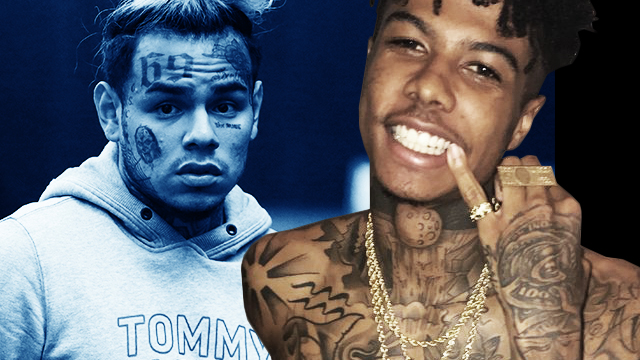
This past weekend, Blueface got arrested. I don’t mean to be flip in writing it this way, I mean to be blunt. The 22-year-old rapper, who loudly touts his affiliation with Los Angeles’ School Yard Crips, found himself temporarily in jail thanks in part due to his propensity for throwing up signs and proclaiming his association with the group. When police were notified that a group of rappers were in Downtown LA flashing cash and jewelry, they converged on the area, arresting Blueface — real name Jonathan Porter — for possession of a loaded handgun. His bail was set at $35K and he was released within hours, dodging the proverbial bullet. At least for now.
The situation sounds thoroughly familiar to me and to any resident of the gang-ridden neighborhoods of south Los Angeles and similar inner-city neighborhoods. Guns, gang signs, arrests, and bail are like facts of life in these areas, and almost anyone you meet is as likely to have spent time in lockup as not. There’s a saying about “knuckleheads” like the type Blueface chooses to associate himself with, that “there are only two place they can end up: Dead or in jail.” The Crip lifestyle rarely ends any other way.
The above story may also sound familiar to anyone who’s followed the story of one of hip-hop’s most attention-getting and controversial personalities of the past few years. Tekashi 69, the rabble-rousing, social media trolling, rainbow-haired Brooklyn rapper born Daniel Hernandez pled guilty last week to charges including firearms offenses, narcotics trafficking, violent crimes, and racketeering. The sequence of events that led him down the path to this downfall started with him linking up with the Nine Trey Bloods New York City gang. That old adage came true for Tekashi, even though he admitted himself that he only flaunted the Blood connection as a promotional tactic to sell records and increase his profile.
While there are obvious differences between the two that beyond their respective bandana colors, Blueface can and should view Tekashi’s experience as instructive. As his profile in rap rises, he’ll have to make a choice: Does he want to be a gang banger or a hip-hop star? While the success of prior stars like Snoop Dogg, YG, and The Game may make it seem like these two poles are closer together than they really are, in truth, they’re damn near mutually exclusive.
The whole point of gang activities is to remain low profile — there’s a reason the “no snitching” rule was instituted long ago and enforced with an ironclad tenacity since. But a rap star is by definition popular and well-known. It’s almost impossible to perpetrate crimes like the ones Tekashi was implicated in without being noticed when you’re under the level of scrutiny that burgeoning stars like Tekashi and Blueface often are. If Blueface really wants to be a hip-hop superstar and live up to his full potential, he’ll have to leave his old ways behind.
I get it, it’s not so easy to leave behind a part of your identity as your circumstances change, as Tekashi found out when he fired the Nine Treys as his management and they plotted to assassinate him in response. Adapting to the new environment of corporate offices and out-of-the-way recording studios — let alone the out-of-town trips and late nights at performance venues — can be a crucible for someone like Blueface who was admittedly never a lifelong devotee of the entertainment lifestyle. Furthermore, it’s hard to leave behind the gang life. The few individuals I know who have ever successfully done so only managed it after long stints in prison, well into their middle age. There are rules and regulations that come with the lifestyle, and they are enforced with both violence and social pressure.
Nobody wants to “go Hollywood” and leave their friends and family behind. “Selling out” or “turning your back on the hood” are cardinal crimes in the high-pressure, low-opportunity environments rappers like Blueface come from. But at the same time, keeping those same people and those same behaviors around you will constantly endanger the success you’ve built through your talent and the benefits of keeping them around are never really worth the risk. Big entourages can be expensive to maintain and artists often find themselves being held responsible for the actions of their crews. Meanwhile, with the increased visibility that comes with being a star, authorities often single out the most prominent member of the gang — the rapper — for observation during criminal investigations as they did with Tekashi.
That’s why well-known affiliates mainly downplay their connections in interviews, if not in their music. If you ask Nipsey Hussle or Vince Staples about their Crip affiliations, especially on camera, they’ll often wave you off, jokingly replying “I don’t know anything about that.” Snoop Dogg may not deny his membership with Long Beach’s Rolling 20s, but he also stays out of the hood for the most part and prefers to highlight his work with youth football and his business endeavors like his cookbook or his TV shows. Game moved out of Compton a long time ago and when he returns, he comes bearing charitable donations for kids and basketballs, not guns and bandanas.
Blueface is uniquely positioned for one of rap’s greatest breakouts right now. Drake has co-signed him, as have fellow west coast rap luminaries like YG and Ice Cube, who added the exact caveat that I’ve argued here. He must tone down the gang bang culture in his lifestyle, if not his raps, despite the fact that the perceived authenticity it brings is part of his appeal. It may have helped him get to where he is now, but in the future, it’ll only be an albatross hanging around his neck and dragging him down. The best time to step away is now, on the cusp of true stardom, before it costs him even more money, time, or worse, his life.






